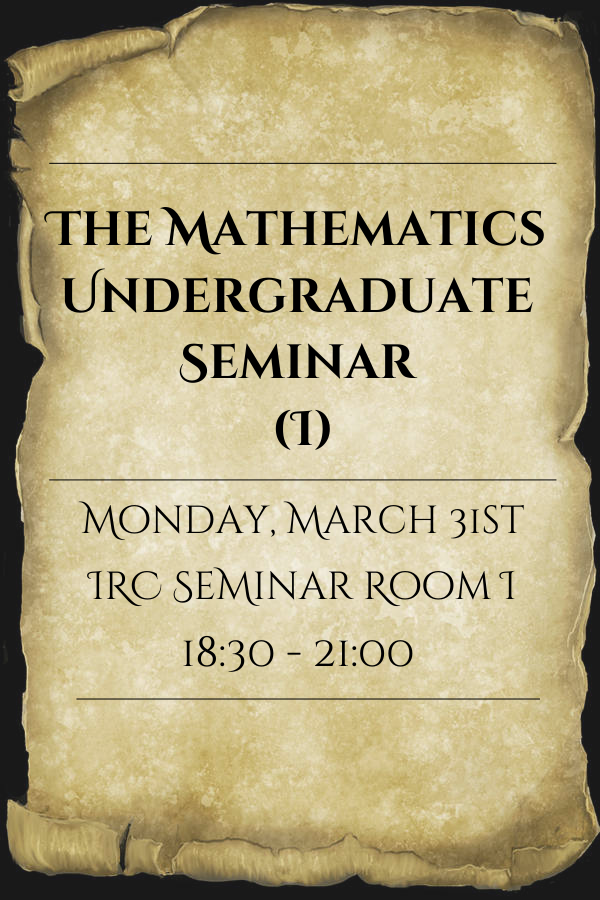the mathematics undergraduate seminar (i)
here's to many more to come!
talks
The very-first undergraduate seminar displayed three motivated speakers. To them, we extend our gratitude for the amazing talks!
Please utilise the top-right icon to navigate through each talk.
abstracts
Shortly before the first talk, we commence with an introductory talk on the history and methodology of this seminar concept.
| Talk | Abstract | |
|---|---|---|
| Random Walks on \(\mathbf{\mathbb Z^d}\) 19:00—19:30 by Klesta Qehaja | A drunk man will find his way home, but a drunk bird may get lost forever” — why does dimension dictate destiny? This intriguing observation lies at the heart of random walks, a fundamental concept bridging probability, physics, and real-world phenomena. In this talk, we explore how the behavior of random walks shifts dramatically with dimensionality. We sketch a proof of this dichotomy, linking combinatorial intuition to deeper mathematical principles. Beyond theory, we highlight applications—from stock market modeling to reveal how random walks underpin unpredictability in dinancial systems. Could the same mathematics that explains a drunkard’s path also hint at why stock prices defy perfect prediction? With this talk you will not only understand this surprising connection — you’ll see how randomness weaves through the fabric of our world. | |
| Shor's Quantum Algorithm 20:00—20:30 by Ahmed Maghri | Shor’s algorithm presents a polynomial-time quantum solution to the integer factorization problem, threatening classical encryption protocols like RSA. We introduce the mathematical and computational foundations required to understand the algorithm, including modular arithmetic, continued fractions, and quantum principles. We then provide a step-by-step breakdown of Shor’s algorithm and its quantum subroutine, emphasizing accessibility and conceptual clarity, while also addressing practical constraints in current quantum hardware. The talk aims to make the concepts of Shor's algorithm accessible a general audience, while maintaining mathematical rigor and conceptual depth throughout. | |
| On the Piccard—Vessiot Theory of Differential Equations 20:30—21:00 by Pablo Santos Guerrero | This talk will focus on the convenience of combining Algebraic Geometry to study differential equations. The statement of interest is Louiville's Theorem, regarding the general solutions of Linear Differential systems. The algebraic methods discussed in this talk were originally developed by French mathematician Évariste Galois to analyse and study the solvability of polynomial equations. Central to the narrative of this talk is Picard-Vessiot theory, a differential analogue of Galois theory. We will demonstrate how solutions to linear differential equations generate field extensions and how their symmetries are captured by linear algebraic groups, studied rigorously via the Zariski topology. This topology transforms group-theoretic properties into geometric objects, enabling us to classify solvability by quadratures (integrals, exponentials, and algebraic functions) through the structure of the group’s identity component. Just as Galois revolutionized algebra with his work, this talk is an invitation to share with you the regard for algebra and its usefulness in many areas of mathematics, still developing to this day. | |
papers
Participation in the UgS concludes with extended articles on the chosen topics. Unlinked articles are not yet ready for review.
i.1) Shor’s Quantum Algorithm. Ahmed Maghri.
i.2) Random Walks on \(\mathbf{\mathbb Z^d}\). Klesta Qehaja.
i.3) On the Piccard—Vessiot Theory of Differential Equations. Pablo Santos Guerrero
poster
Displaying this nice poster once again :)
